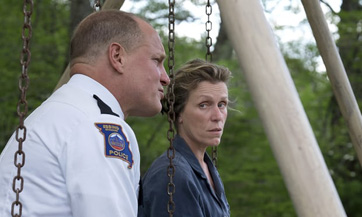|
|
They Shoot Oscar Prognosticators, Don't They?Op-Ed: The Oscar Race in the Age of TrumpBy J. Don BirnamMarch 1, 2018
Del Toro’s love poem is a subtle rebuke to many of the policies set forth by the Trump administration. It features a mute woman who is sexually harassed and aided by her aging gay neighbor and black coworkers. It glorifies the 1950s for its art and music and movies, but does not ask that we be taken back to that time, as if that is when we were last great. On the contrary, it is critical of that time as not serving the oppressed. So, Shape of Water is a message movie, subtly, brilliantly I’d argue, but it is nonetheless. But that may not be the message that they want to give, or that they read into it, and that of course is OK. My message does not need to be their message, just so long as they have one. And that is the whole point of my arguments. The problem with La La Land was that the ONLY message you could gleam from it was that THEY (Hollywood) are amazing. Really? If that is the message they want…oof. But it wasn’t. Why Three Billboards, not my pick, is an OK Pick But what of Three Billboards? Martin McDonagh’s dark comedy is undeniably a message movie as well. Unlike most people in the movie world who do not love the movie, my problem with it is not so much its message (to which I will get momentarily). For me, the method of delivery is all wrong. My own perspective is cynical, and I find contrived and unbelievable that individuals would behave the way the characters in the story do. The easily redeemed villain, the maligned and misunderstood sheriff, the complex heroine who is actually cruel and vindictive. It is the archetypical movie that sets it all up to deliver its punchline, not realistically, not subtly, but over your head, banging you repeatedly. I hate to say it, but, yes, like Crash. Its agenda is on its sleeve and it comes off in ways that make it seem more like a fairytale than even The Shape of Water is. My patience wears thin for that kind of manipulation. As I reflected to write this column, however, it dawned on me that despite the foregoing, Three Billboards’ relevance to this day and age cannot be denied. One narrative that has emerged since the 2016 election is that people in certain parts of the country feel neglected. This is the movie that tries to understand and empathize with that. The most rescuable message I can extract from the movie is that humans are complex, shades of grey, and cannot be reduced to good or evil. To the contrary, all humans act in reprehensible ways at times, and all are redeemable. It is almost an optimistic message (and perhaps the reason I instinctively reject it). Good for McDonagh for having that view, and good for the Academy, I suppose, for embracing it. Sure, the Academy could send different types of messages this year. It can talk about the importance of the press and women in power (think, The Post), of leadership and the power of words (Darkest Hour), or racial tension from a different perspective (Get Out). I’m not sure that all of the movies in this year’s race have a similarly deep message (are Call Me By Your Name or Lady Bird this year’s La La Land? sorry fans). But the ones that seem likely to win are not those movies, they are the ones, yes, like Three Billboards, that do say something that relates somehow to the conversation that is going on in today’s body politic and society. At the very least, then, the Academy is not in danger of voting itself into irrelevance like it was with its choice last year, until they made the better choice. At most, I can argue that their choice of Three Billboards may raise questions (valid or not) about the scope or perspective of their politics, their views, etc. But, my own disagreement with their leanings and their reading of a movie, and about the message they want to send, should not and does not lead me to condemn them. It is their pick, not mine. It is their message, not mine. I may not like how it is delivered or I may feel uncomfortable with it, but I cannot in honesty decry or trash it. Good for them, then.
|

|
|
|

|
Thursday, October 31, 2024
© 2024 Box Office Prophets, a division of One Of Us, Inc.


